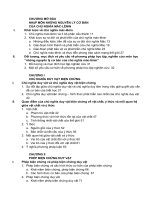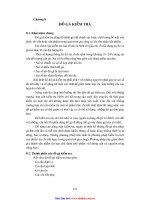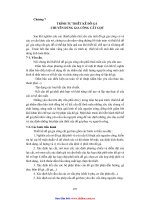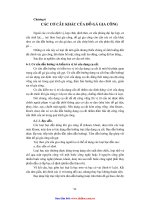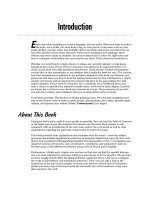Giáo trình động từ tiếng Pháp - Part IV Looking Ahead: The Future and the Conditional Tenses - Chapter 15 pptx
Bạn đang xem bản rút gọn của tài liệu. Xem và tải ngay bản đầy đủ của tài liệu tại đây (379.58 KB, 12 trang )
Part IV
Looking Ahead: The Future
and the Conditional Tenses
21_773883 pt04.qxp 7/28/06 8:45 PM Page 171
In this part . . .
A
fter a long winter, do you look forward to spring?
After an exhausting week at work, do you look for-
ward to the weekend? If so, you’re not alone. But how do
you look forward to things, like your weekend, your vaca-
tion, or to a celebration? With the future tense of course.
This part shows you how to form the future tense so
you can express anything you can imagine in the future.
In addition to forming the future tense, I also show you how
to use it in French, which is important because you use the
future tense a bit differently in French than in English fol-
lowing certain expressions. I also explain the future perfect
tense, which you use when you want to state that one
future action has to happen before another future action
can occur, or that you will have to finish something by
a certain time.
In addition to the future and future perfect, I show you
how to form and use the conditional and past conditional
tenses. You can order anything you want to eat or drink in
a French restaurant with the conditional tense and show
your good manners at the same time.
21_773883 pt04.qxp 7/28/06 8:45 PM Page 172
Chapter 15
Moving Forward with the Future Tense
In This Chapter
ᮣ Forming the regular and irregular forms of the future tense
ᮣ Knowing the differences between the future tense in English and in French
ᮣ Expressing yourself in the future tense
I
magine you’re sitting in a café with your best friend and she asks whether you’ve ever
been to Bora Bora. What a coincidence. You’ve never been there, but you’re planning on
going next month. Do you know which verb tense you use to describe your trip next month?
In order to describe your trip to Bora Bora next month, you use the future tense. With this
tense you can describe events that will occur either at a specific time or an unspecified time
in the future. In this chapter, you can discover how to form the future tense and how to use
it with various expressions.
Forming the Future of Regular Verbs
Do you want to tell your sister about your upcoming doctor’s visit? Or perhaps you want to
tell your brother about the French test you’re dreading that you have to take next week. You
need to use the future tense, which is one of the simplest tenses to form.
Creating the future tense for regular
-er, -ir, and -re verbs is a piece of cake. All you have to
do is take the infinitive verb, which serves as the stem, and simply add the appropriate end-
ings. Remember that the future stem of all verbs, be they regular or irregular, always ends in
-r. So for -er and -ir verbs, just add the endings. For -re verbs, drop the e and then add the
appropriate endings, which I show in the following examples.
Note: Even some irregular
verbs (those that have an irregular conjugation in the present tense) are regular in the
future because they have a regular stem in the future (just take their infinitives and add the
endings to form the future).
Future Tense Verb Endings
je -ai nous -ons
tu -as vous -ez
il/elle/on -a ils/elles -ont
Do these future endings look familiar? If you’re familiar with the present conjugation of
avoir (to have), you may notice a similarity.
The following are the three categories of regular verbs —
-er, -ir, and -re — in the future
tense.
22_773883 ch15.qxp 8/2/06 1:35 PM Page 173
parler (
to speak
)
je parlerai nous parlerons
tu parleras vous parlerez
il/elle/on parlera ils/elles parleront
Je parlerai à l’agent de voyage demain. (
I will speak to the travel agent tomorrow.
)
finir (
to finish
)
je finirai nous finirons
tu finiras vous finirez
il/elle/on finira ils/elles finiront
Ils finiront leurs études l’année prochaine. (
They will finish their studies next year.
)
vendre (
to sell
)
je vendrai nous vendrons
tu vendras vous vendrez
il/elle/on vendra ils/elles vendront
Nous vendrons nos livres à la fin du semestre.
(
We will sell our books at the end of the semester.
)
Put these verbs in the future tense.
Q. Tu _________________ (étudier).
A. Tu étudieras. (You will study.)
1. Les enfants _________________ (jouer).
2. Il _________________ (apprendre).
3. Vous _________________ (comprendre).
4. Je _________________ (travailler).
5. Nous _________________ (partir).
6. Elle _________________ (réussir).
7. Tu _________________ (lire).
8. Vous _________________ (boire).
9. Les étudiants _________________ (répondre).
10. Nous _________________ (arriver).
174
Part IV: Looking Ahead: The Future and the Conditional Tenses
22_773883 ch15.qxp 8/2/06 1:35 PM Page 174
Forming the Future of Spelling-Change Verbs
Some -er verbs have a mute or silent e in the infinitive. When you conjugate these
types of verbs in the present tense, some spelling changes are required in order to
pronounce the mute
e. You either add an accent grave to the e, like so (è), or you
double the consonant after the mute
e. (See Chapter 3 for a list of these types of
verbs.) The same types of changes occur to these verbs in the future tense. In order
to pronounce the mute
e in the infinitive, add an accent grave to the e (see Table 15-1)
or double the consonant after the mute
e (see Table 15-2). Now add the future end-
ings, which are always the same.
Verbs whose infinitive form ends in
-yer change to -ier before the endings; I show you
examples of these verbs in Table 15-3. (The only exception is the verb
envoyer [to
send
], whose future stem is enverr )
Table 15-1 Adding an Accent Grave (è) to Spelling-Change
Verbs in the Future Tense
Verb Future Tense Stem
acheter (
to buy
) achèter-
amener (
to bring
) amèner-
mener (
to lead
) mèner-
(se) lever (
to rise/to stand up
) (se) lèver-
(se) promener (
to go for a walk/a stroll
) (se) promèner-
Table 15-2 Doubling the Consonant of Spelling-Change
Verbs in the Future Tense
Verb Future Tense Stem
épeler (
to spell
) epeller-
jeter (
to throw
) jetter-
(s’) appeler (
to call/to call oneself/to be named
) (s’) appeller-
Table 15-3 Changing -yer to -ier with Spelling-Change Verbs
in the Future Tense
Verb Future Tense Stem
employer (
to use
) emploier-
essayer (
to try
) essaier-
nettoyer (
to clean
) nettoier-
175
Chapter 15: Moving Forward with the Future Tense
22_773883 ch15.qxp 8/2/06 1:35 PM Page 175
J’achèterai mon billet la semaine prochaine. (I will buy my ticket next week.)
Elle appellera son chien. (She will call her dog.)
Nous nettoierons notre chambre. (We will clean our room.)
The following verbs don’t have a stem change in the future tense. In other words,
don’t change the accents in the infinitive for
espérer (to hope), préférer (to prefer),
and
répéter (to repeat).
Tu répéteras après le professeur. (You will repeat after the professor.)
Put these verbs in the future tense and then translate the sentences.
Q. Je _________________ (épeler) le nom du pays. __________________________________
A. J’épellerai le nom du pays. I will spell the name of the country.
11. Nous _________________ (essayer) la mousse au chocolat.
__________________________________________________________________________________
12.
Ils _________________ (amener) leurs amis.
__________________________________________________________________________________
13.
Vous _________________ (jeter) la balle.
__________________________________________________________________________________
14.
Je _________________ (appeler) mon ami.
__________________________________________________________________________________
15.
Tu _________________ (nettoyer) ta chambre.
__________________________________________________________________________________
16.
Elle _________________ (acheter) le jouet.
__________________________________________________________________________________
17.
Nous _________________ (préférer) le thé.
__________________________________________________________________________________
18.
Elles _________________ (mener) le groupe.
__________________________________________________________________________________
19.
Tu _________________ (espérer) voyager.
__________________________________________________________________________________
20.
Vous _________________ (employer) l’ordinateur.
__________________________________________________________________________________
176
Part IV: Looking Ahead: The Future and the Conditional Tenses
22_773883 ch15.qxp 8/2/06 1:35 PM Page 176
Forming the Future of Irregular Verbs
Some verbs have an irregular future stem. However, the endings remain the same.
Table 15-4 lists the verbs with the irregular future tense stem.
Table 15-4 Irregular Future Tense Verbs
Irregular Verb Future Tense Stem
aller (
to go
) ir-
avoir (
to have
) aur-
courir (
to run
) courr-
devenir (
to become
) deviendr-
devoir (
to owe, to have to
) devr-
envoyer (
to send
) enverr-
être (
to be
) ser-
faire (
to do, to make
) fer-
falloir (
to have to, to must
) faudr-
mourir (
to die
) mourr-
pleuvoir (
to rain
) pleuvr-
pouvoir (
to be able to
) pourr-
recevoir (
to receive
) recevr-
retenir (
to retain, to keep
) retiendr-
revenir (
to come back
) reviendr-
savoir (
to know
) saur-
tenir (
to hold
) tiendr-
valoir (
to be worth
) vaudr-
venir (
to come
) viendr-
voir (
to see
) verr-
vouloir (
to want to
) voudr-
J’irai à la plage. (I will go to the beach.)
Elle saura la réponse bientôt. (She will know the answer soon.)
Put the following verbs in the future tense and translate them.
Q. Il _________________ (pleuvoir) demain.
A. Il pleuvra demain. It will rain tomorrow.
177
Chapter 15: Moving Forward with the Future Tense
22_773883 ch15.qxp 8/2/06 1:35 PM Page 177
21. Vous _________________ (aller) au cinéma.
__________________________________________________________________________________
22.
Tu _________________ (venir) ce soir.
__________________________________________________________________________________
23.
Ils _________________ (voir) le film.
__________________________________________________________________________________
24.
Je _________________ (pouvoir) sortir.
__________________________________________________________________________________
25.
Nous _________________ (faire) le marché.
__________________________________________________________________________________
Identifying the Differences between English
and French when Using the Future Tense
You use the future tense a bit differently in French than in English. In French, you use
the future with expressions that imply a future action, as in the expressions
as soon
as
and when. For example, in English you say, When I go to France, I will speak French.
However, you aren’t in France yet and therefore this implies a future action. The
French say,
When I will go to France, I will speak French. Table 15-5 is a short table
with these expressions.
Table 15-5 Expressions Followed by the Future
French Expression English Translation
aussitôt que
as soon as
dès que
as soon as
lorsque
when
quand
when
tant que
as long as
Aussitôt que papa rentrera, nous dînerons. (As soon as dad comes [will come]
home, we will have dinner.
)
Translate the following sentences. Remember that the future tense is used in both
clauses in French.
Q. As long as it doesn’t rain, we will go to the beach.
A. Tant qu’il ne pleuvra pas, nous irons à la plage.
178
Part IV: Looking Ahead: The Future and the Conditional Tenses
22_773883 ch15.qxp 8/2/06 1:35 PM Page 178
26. As soon as we have dinner, we will go to the movies.
__________________________________________________________________________________
27.
When they go to Rome, they will visit the Coliseum.
__________________________________________________________________________________
28.
I will travel as soon as I have enough money.
__________________________________________________________________________________
29.
When we wake up, we will have breakfast.
__________________________________________________________________________________
30.
She will have a glass of wine when she finishes these exercises.
__________________________________________________________________________________
Expressing Yourself and Using References:
Future Style
After you become comfortable creating the simple future tense, you’ll become famil-
iar with some expressions and when to use them. These expressions allow you to
form complete sentences in order to describe future events. Table 15-6 lists some
time expressions, which provide more specific information as to when in the future
the event will take place. You can place them either in the beginning or at the end of
the sentence.
Table 15-6 Important Expressions to Use with the Future Tense
French Expression English Translation
demain
tomorrow
demain matin
tomorrow morning
demain après-midi
tomorrow afternoon
demain soir
tomorrow evening
la semaine prochaine
next week
le mois prochain
next month
l’année prochaine
next year
lundi prochain
next Monday
plus tard
later
cet après-midi
this afternoon
ce soir
this evening
cet été
this summer
179
Chapter 15: Moving Forward with the Future Tense
22_773883 ch15.qxp 8/2/06 1:35 PM Page 179
Ils passeront un examen demain. (They will take the test tomorrow.)
Translate the following sentences into French by using the future tense.
Q. I will see my friends next Monday.
A. Je verrai mes amis lundi prochain.
31. We will travel to Europe this summer.
__________________________________________________________________________________
32.
I will play tennis next week.
__________________________________________________________________________________
33.
My in-laws will be arriving later.
__________________________________________________________________________________
34.
The professors will attend a conference next month.
__________________________________________________________________________________
35.
My friends and I will go to the movies Saturday evening.
__________________________________________________________________________________
Now translate the following sentences from French to English by using the future tense.
Q. Je partirai demain matin.
A. I will leave tomorrow morning.
36. Ils étudieront pour l’examen final.
__________________________________________________________________________________
37.
Michelle se réveillera à 7 heures demain matin.
__________________________________________________________________________________
38.
Nous nagerons cet après-midi.
__________________________________________________________________________________
39.
Vous vous verrez la semaine prochaine.
__________________________________________________________________________________
40.
Il achètera une nouvelle voiture.
__________________________________________________________________________________
180
Part IV: Looking Ahead: The Future and the Conditional Tenses
22_773883 ch15.qxp 8/2/06 1:35 PM Page 180
181
Chapter 15: Moving Forward with the Future Tense
Answer Key
In this section you can find all the answers to the practice exercises in this chapter.
How did you do?
a
Les enfants joueront. (The children will play.)
b
Il apprendra. (He will learn.)
c
Vous comprendrez. (You will understand.)
d
Je travaillerai. (I will work.)
e
Nous partirons. (We will leave.)
f
Elle réussira. (She will succeed.)
g
Tu liras. (You will read.)
h
Vous boirez. (You will drink.)
i
Les étudiants répondront. (The students will answer.)
j
Nous arriverons. (We will arrive.)
k
Nous essaierons la mousse au chocolat. We will try the chocolate mousse.
l
Ils amèneront leurs amis. They will bring their friends.
m
Vous jetterez la balle. You will throw the ball.
n
J’appellerai mon ami. I will call my friend.
o
Tu nettoieras ta chambre. You will clean your room.
p
Elle achètera le jouet. She will buy the toy.
q
Nous préférerons le thé. We will prefer tea.
r
Elles mèneront le groupe. They will lead the group.
s
Tu espéreras voyager. You will hope to travel.
t
Vous emploierez l’ordinateur. You will use the computer.
u
Vous irez au cinéma. You will go to the movies.
v
Tu viendras ce soir. You will come this evening.
w
Ils verront le film. They will see the film.
x
Je pourrai sortir. I will be able to go out.
y
Nous ferons le marché. We will do the shopping.
22_773883 ch15.qxp 8/2/06 1:35 PM Page 181
182
Part IV: Looking Ahead: The Future and the Conditional Tenses
A
Aussitôt que nous dînerons, nous irons au cinéma.
B
Quand ils iront à Rome, ils visiteront le Colisée.
C
Je voyagerai dès que j’aurai assez d’argent.
D
Lorsque nous nous réveillerons, nous prendrons le petit-déjeuner.
E
Elle aura un verre de vin quand elle finira ces exercices.
F
Nous voyagerons en Europe cet été.
G
Je jouerai au tennis la semaine prochaine.
H
Mes beaux-parents arriveront plus tard.
I
Les professeurs assisteront à une conférence le mois prochain.
J
Mes amis et moi iront au cinéma samedi soir.
K
They will study for the final exam.
L
Michelle will wake up at 7 o’clock tomorrow morning.
M
We will go swimming this afternoon.
N
You will see each other next week.
O
He will buy a new car.
22_773883 ch15.qxp 8/2/06 1:35 PM Page 182
